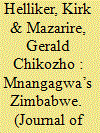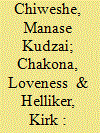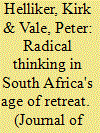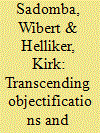| Srl | Item |
| 1 |
ID:
178254


|
|
|
|
|
| Summary/Abstract |
Three years after the November 2017 coup in Zimbabwe and the installation of Emmerson Mnangagwa as ruling party and state president, there is growing scholarly interest in identifying the character of the post-coup regime, particularly in comparison to the 37-year reign of Robert Mugabe’s ZANU-PF. So far, there are continuities and changes, with increasing concerns about a qualitative shift in the militarization of Zimbabwean state and society under Mnangagwa and the further closing down of civil society space. Perhaps more so than during the first two years of post-coup Zimbabwe, this has become abundantly clear during the Covid-19 pandemic lockdown.
|
|
|
|
|
|
|
|
|
|
|
|
|
|
|
|
| 2 |
ID:
142521


|
|
|
|
|
| Summary/Abstract |
In this article, we focus on patriarchy, women, land and livelihoods on A1 farms in Zimbabwe which arose from the fast track land reform programme. There is now significant literature on A1 farms in Zimbabwe. These studies include a number of ethnographic and comparative studies but this literature does not give sustained attention to patriarchy and women. In addition, though, a small number of works have appeared based upon a more focused gender analysis. We draw upon this more focused literature and offer fresh fieldwork evidence based on recent studies undertaken by two of the authors, in Goromonzi and Mazowe districts. At times, radical socio-spatial reorganisation such as fast track may destabilise systems of patriarchy. In the case of fast track, there has been a reconfiguration of relations between men and women yet this is uneven and contradictory and remains within the confines of patriarchal structures, practices and discourses. At the same time, women have manoeuvred and negotiated at local levels to enhance their lives and livelihoods.
|
|
|
|
|
|
|
|
|
|
|
|
|
|
|
|
| 3 |
ID:
115255


|
|
|
|
|
| Publication |
2012.
|
| Summary/Abstract |
This article traces the rise and fall of radical praxis in South Africa and offers a critique of the prevailing practices of former Marxists under post-apartheid conditions. Western Marxism emerged in the 1970s in South Africa and Marxist activists became deeply involved in the liberation movements. With the unravelling of apartheid, the main liberation forces made a social pact with capitalist forces and former Marxists embraced a statist project. In the context of the rise of 'new' social movements, radical thinking of a more Libertarian kind is emerging in contemporary South Africa.
|
|
|
|
|
|
|
|
|
|
|
|
|
|
|
|
| 4 |
ID:
096045


|
|
|
|
|
| Publication |
2010.
|
| Summary/Abstract |
In the academic literature, civil society is often conceptualized in terms of objectifications and subject-object dichotomies. This is the case with regard to both social movements and non-governmental organizations. This article seeks to transcend such argumentation by providing 'thick descriptions' of the agency of farm workers and civil society in the context of land reform in contemporary Zimbabwe. We examine a land-based social movement (and the role of farm workers within it) and the involvement of a particular non-governmental organization in farm worker livelihoods. On this basis, we offer a re-formulation of civil society as a social field marked by ambivalences and tensions.
|
|
|
|
|
|
|
|
|
|
|
|
|
|
|
|